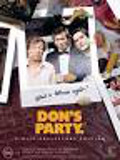
Directed by
Bruce Beresford
90 minutes
Rated MA
Reviewed by
Bernard Hemingway

Don's Party
Anyone under the age of thirty seeing this film is likely to marvel at the Neanderthalic state of Australian middle-class culture at the beginning of the 1970s. It may seem almost incredibly crude now but scriptwriter David Williamson, who adapted his own hit play about a schoolteacher and failed writer and his cronies, no doubt drew on a good measure of first-hand experience.The film, shot almost entirely at night in a single interior, was a commercial and critical success with both Williamson and Beresford winning AFI's (and other awards going to Pat Bishop (Jenny) and Veronica Lang (Jody) for Best Actress and Best Supporting Actress and William Anderson for editing).
Australian films of the 1970s tended to fall into two camps - tasteful period dramas like Picnic At Hanging Rock (1975) and bawdy sex romps like Stork, (1971), which Williamson also wrote. Don's Party falls, if not exactly between the two, then at the top end of the sex romp category even if the boozy, blokey.sexism is treated with more of a critical cast something which makes its uncouth Ockerism almost too painful to watch.
John Hargreaves plays Don Henderson who is holding a party at his house on election night of 1969 to celebrate what he expects to be the victory of Gough Whitlam's Labor Party over John Gorton's incumbent Liberal Party. The party, which is made up a small group of Don's friends, gradually comes unstuck as, fuelled by their disappointment at losing the election, the men get hammered.
One imagines the stage version would have been more effective as the casting here never seems particularly convincing, even if the performances are - Graham Kennedy and Ray Barrett are too old to be Don's university pals, let alone the fact that they are hardly credible as mates and Harold Hopkin's supposed lawyer is far too crass even by the standards of his peers, low as they may be. The women seem much more credible but this is perhaps only because they have less to do except forbear their male counterparts. Equally, the narrative development seems forced, as if the characters from the get-go had set about turning the party into an inter-personal free-for-all, perhaps Beresford with his Barry McKenzie films behind him more so than Williamson, being responsible for playing for comedic entertainment rather than social critique (a poster for a Barry Humphries' stage show features prominently throughout the film).
FYI: The film revived Beresford's reputation after the drubbing he received for the Barry McKenzie films whilst cinematographer Don McAlpine also went onto to a successful Hollywood career..
Want something different?





